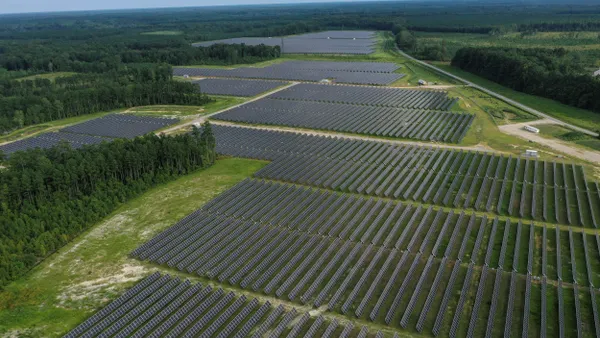Dive Brief:
- The New Jersey Board of Public Utilities (BPU) last week approved a rule to begin the process of developing an "orderly and transparent mechanism" for shuttering the current Solar Renewable Energy Credit (SREC) program.
- Clean energy legislation signed by New Jersey Gov. Phil Murphy in May required the BPU to adopt new regulations within 180 days that would halt accepting new applications to the the SREC program.
- The process is necessary to develop and transition to a "sustainable program that will support the continued growth of new, cost effective solar generation in the state," regulators said. The clean energy bill raises the state's renewable portfolio standard (RPS) to 50% by 2030.
Dive Insight:
New Jersey has almost doubled its renewable energy goals, up from the previous 24.4% by 2028. Meeting the higher targets will require a new way to incentivize solar generation, the BPU said.
The new clean energy law calls for transitioning away from the SREC system, which has come under some criticism for the price volatility of its credits.
The new law requires the program to be closed, once 5.1% of the kilowatt-hours sold by the state's electric power suppliers are coming from solar electric power generators connected to the state's distribution system. BPU will indicate in an order when that milestone has been met, but in any case, the law requires the closure of the SREC program no later than June 1, 2021.
The BPU said it will soon launch a study evaluating how to modify or replace the SREC program to "create an orderly transition to a new program for continued growth and investment in diverse solar resources that continuously reduce costs to ratepayers."
The agency said it intends to begin working this summer with state agencies, solar power providers and financiers, industry experts, regional grid operators, public utilities, and other stakeholders, as it begins developing an alternative to SREC. In addition, BPU staff will hold a stakeholder meeting this summer on a pending community solar straw proposal.
In the long-term, New Jersey has ambitious clean energy goals. Combining nuclear and renewables, the state is developing a path to 100% emissions-free electricity by 2050.
The legislation signed by Murphy also provides support for the state's nuclear fleet, which has struggled to compete with natural gas. The new Zero Emissions Certificate aims to maintain nuclear power's current 40% contribution to the state's electrical needs in perpetuity.














